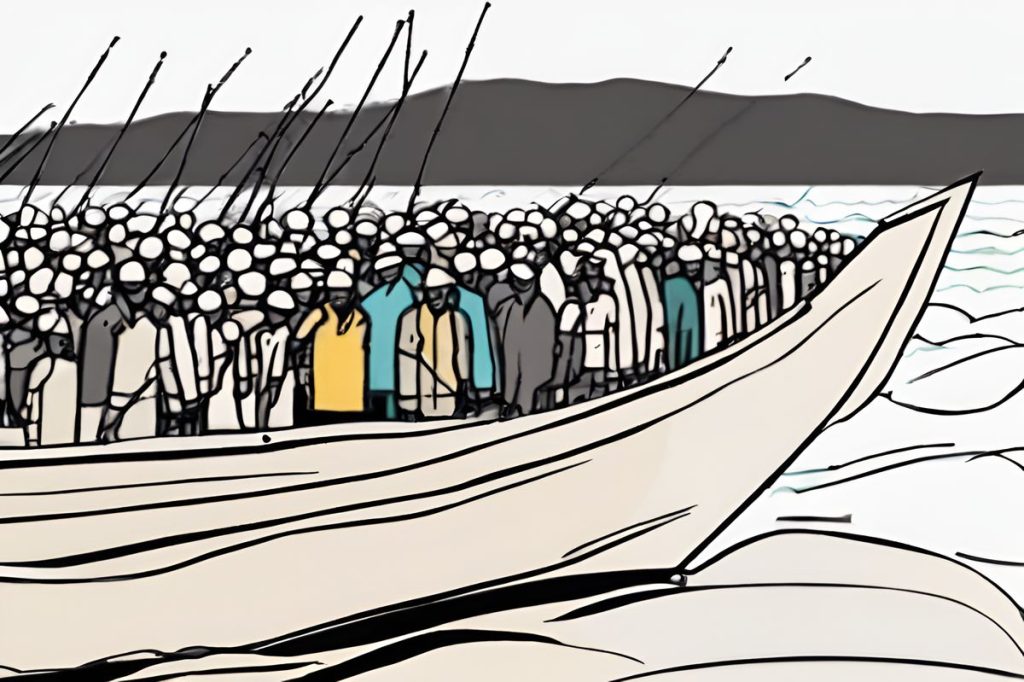Migrants off Cyprus are facing increased patrols and policy changes affecting asylum applications, particularly for Syrians. Identity checks at ports like Larnaca have become routine as EU nations struggle to address the influx of individuals seeking refuge from instability.
What challenges are migrants facing off the coast of Cyprus?
Migrants off the coast of Cyprus are encountering increased patrols, with recent policy shifts ceasing asylum applications from Syrians. They must undergo identity checks at ports like Larnaca, amidst a broader crisis where EU nations grapple with sharing responsibilities and providing a humane response to the influx of individuals seeking refuge from instability.
Increased Migrant Activity Near Cape Greco
On a typical Monday that seemed just like any other, the waters around Cyprus revealed a different story. Port authorities, vigilant as ever, spotted two vessels carrying individuals seeking a new life away from their homelands. Near the picturesque Cape Greco, the first boat emerged with 37 souls aboard, a mere number that represents countless hopes and dreams. They were escorted to Larnaca port, a place that has become more than a docking station; it’s now a gateway to new beginnings. Each individual will face a process to establish their identity and origin, a bureaucratic step on their journey to potential asylum.
The second sighting by the police of another boat in the same vicinity stirs questions about the routes and the factors compelling these risky voyages. This pattern of arrivals is not isolated; it comes amidst changing policies that have led to a government decision to cease examining asylum applications from Syrian nationals.
Cyprus and the Broader Migrant Crisis
The island nation of Cyprus finds itself in a unique geographical position, straddling the East Mediterranean, a stone’s throw away from the tumultuous Middle East. Its location has inevitably made it a focal point for migrants and refugees fleeing instability. Cyprus has seen a steady increase in migrant boats reaching its shores, an occurrence that has become part of a larger narrative engulfing the region.
This phenomenon echoes a broader crisis where thousands of individuals are displaced, seeking refuge within the European Union’s borders. The EU has been grappling with forming a cohesive and humane response to this issue, balancing the responsibilities between member states, a task that often leads to political friction and social challenges.
Policy Changes and International Responsibilities
Cyprus’ recent policy shift regarding Syrian asylum seekers represents a significant change in the Mediterranean migration dynamic. The country is now faced with the need to balance international humanitarian responsibilities with domestic resources and capabilities. This delicate act involves international law, including treaties and conventions on refugees to which Cyprus is a signatory. It also involves regional solidarity within the European Union, which has been tested over recent years as nations struggle to find common ground on migration.
The capacity of local ports like Larnaca to handle the influx of migrants not only involves logistics but also the human and empathetic response to those in dire need. Cyprus’ decision and its implications are bound to be part of an ongoing conversation about migration, asylum, and international cooperation.
The Way Forward
While the Cyprus government’s decision might change the landscape of asylum applications, it doesn’t put an end to the movement of people across the sea. The reasons driving these individuals to embark on such perilous journeys – war, persecution, economic hardship – persist.
Looking towards the future, it will be crucial for countries like Cyprus to work closely with international organizations, NGOs, and other EU member states to forge a path that respects human dignity and international law. The need for comprehensive immigration reform, enhanced border security, coupled with sustainable integration policies, will continue to shape the discourse.
These maritime incidents off the coast of Cape Greco are but a snapshot of the ongoing narrative of human migration. They underscore the need for global awareness, empathy, and action. It is a call for nations to come together, to find long-term solutions that transcend borders and politics for the sake of humanity.
What challenges are migrants facing off the coast of Cyprus?
Migrants off the coast of Cyprus are encountering increased patrols, with recent policy shifts ceasing asylum applications from Syrians. They must undergo identity checks at ports like Larnaca, amidst a broader crisis where EU nations grapple with sharing responsibilities and providing a humane response to the influx of individuals seeking refuge from instability.
What is the significance of increased migrant activity near Cape Greco?
The increased migrant activity near Cape Greco highlights the ongoing challenges faced by individuals seeking refuge, as well as the vigilance of port authorities in Cyprus. The recent sightings of migrant vessels emphasize the complex factors driving these risky voyages and the bureaucratic processes migrants must navigate to establish their identity and potentially seek asylum.
How does Cyprus fit into the broader migrant crisis in the region?
Cyprus, situated in a geographically strategic location near the Middle East, has become a focal point for migrants and refugees fleeing instability. The island nation’s response to the influx of migrants reflects the larger crisis engulfing the region, as EU nations struggle to address the humanitarian needs of displaced individuals while balancing domestic resources and international responsibilities.
What are the implications of Cyprus’ policy changes regarding Syrian asylum seekers?
Cyprus’ decision to cease examining asylum applications from Syrian nationals represents a significant shift in the Mediterranean migration dynamic. This policy change underscores the delicate balance between international humanitarian responsibilities, domestic capabilities, and regional solidarity within the EU. It also raises questions about the broader conversation on migration, asylum, and the need for international cooperation in addressing the ongoing challenges faced by displaced individuals.

